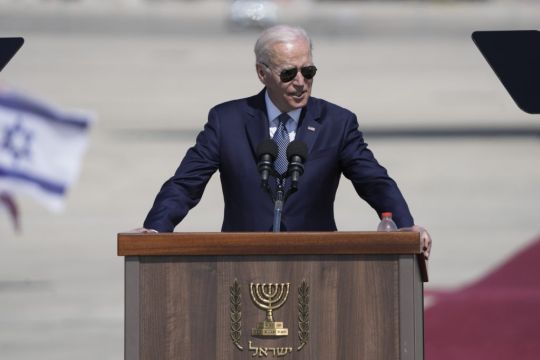President Joe Biden has opened his first visit to the Middle East since taking office by offering Israeli leaders reassurances about his determination to stop Iran’s growing nuclear programme, saying he would be willing to use force “as a last resort”.
The president’s comments came in an interview with Israel’s Channel 12 taped before he left Washington and broadcast on Wednesday, hours after the country’s political leaders welcomed him with a red-carpet arrival ceremony at the Tel Aviv airport.
“The only thing worse than the Iran that exists now is an Iran with nuclear weapons,” Mr Biden said. Asked about using military force against Iran, he said, “If that was the last resort, yes.”
US ally Israel considers Iran to be its greatest enemy, citing its nuclear programme, its calls for Israel’s destruction and its support for hostile militant groups across the region.
The US and Israel are expected on Thursday to unveil a joint declaration cementing their close military ties and strengthening past calls to take military action to halt Iran’s nuclear programme.
A senior Israeli official said before Mr Biden arrived that both countries would commit to “using all elements of their national power against the Iranian nuclear threat”.
Israeli leaders made clear as they marked Mr Biden’s arrival that Iran’s nuclear programme was the top item on their agenda.
“We will discuss the need to renew a strong global coalition that will stop the Iranian nuclear programme,” said Israeli Prime Minister Yair Lapid, as he greeted the Democratic president at the airport ceremony in Tel Aviv.

Mr Biden said he would not remove Iran’s Islamic Revolutionary Guard Corps from the US list of terrorist organisations, even if that kept Iran from rejoining the Iran nuclear deal.
Sanctions on the IRGC, which has carried out regional attacks, have been a sticking point in negotiations to bring Iran back into compliance with the agreement meant to keep it from having a nuclear weapon.
Iran announced last week that it has enriched uranium to 60% purity, a technical step away from weapons-grade quality.
Iran insists its programme is for peaceful purposes, though United Nations experts and Western intelligence agencies say Iran had an organised military nuclear programme through 2003.
Mr Biden’s visit to Israel follows the collapse of a coalition-led government headed by Naftali Bennett. The president was greeted by Mr Lapid, the caretaker prime minister who is hoping to hang on to power when Israelis hold their fifth election in three years this autumn.

Mr Biden made reviving the Iran nuclear deal, brokered by Barack Obama in 2015 and abandoned by Donald Trump in 2018, a key priority as he entered office.
But indirect talks for the US to re-enter the deal have stalled as Iran has made rapid gains in developing its nuclear programme.
That has left the Biden administration increasingly pessimistic about resurrecting the deal, which placed significant restrictions on Iran’s nuclear programme in exchange for sanctions relief.
At the airport, Israeli President Isaac Herzog thanked Mr Biden for championing Israel during his more than 50 years in public office. He then reminded the US president of the “security challenges emanating directly from Iran and its proxies, threatening Israel and its neighbours and endangering our region”.
Israelis seemed determined to underscore the imminent threat from Iran. Soon after he arrived, Mr Biden was briefed on the country’s “Iron Dome” and new “Iron Beam” missile defence systems.
The president later visited the Yad Vashem memorial to Holocaust victims in Jerusalem.
Mr Biden, wearing a skull cap, was invited to rekindle the eternal flame in the memorial’s Hall of Remembrance. Two Marines placed a wreath on the stone crypt containing the ashes of Holocaust victims and Mr Biden listened as a cantor recited the remembrance prayer.
He then greeted two Holocaust survivors, kissing the women on their cheeks. His eyes welled with tears as he chatted with them.
“My mother would say ‘God love you, dear,’” Mr Biden told the women.

The president is set to meet on Thursday with Israeli officials and on Friday with Palestinian leaders.
Mr Biden said he will emphasise in talks with Israel and Palestinian leaders his continued support for a two-state solution to the Israeli-Palestinian conflict.
But he acknowledged that it likely would not be feasible “in the near term”.
Mr Biden is spending two days in Jerusalem for talks with Israeli leaders before meeting Palestinian President Mahmoud Abbas on Friday in the West Bank.
Mr Biden added that a two-state solution is the best way to ensure a “future of equal measure of freedom, prosperity and democracy for Israelis and Palestinians alike”.







